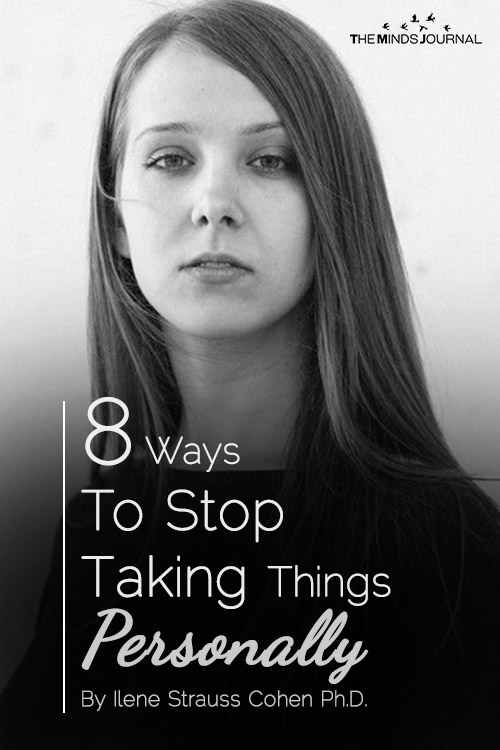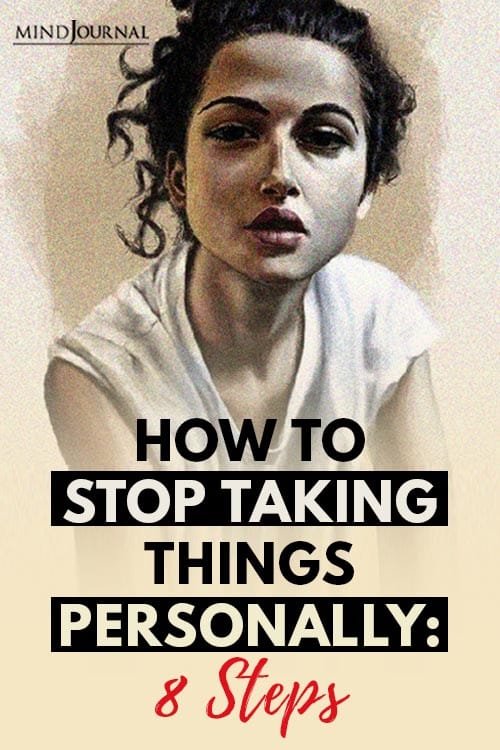How to stop taking things personally? When other people wrong you, and you take their actions personally, it can feel as if you’ve been punched in the gut.
I know that sounds a bit dramatic, but when you’re sensitive — or what some might call hypersensitive — you tend to take things pretty personally.
You feel everything deeply, even if it has nothing to do with you. If people speak badly about you to your face or behind your back, it’s enough to destroy your sense of self-worth.
Sometimes people don’t even have to say anything; you might just interpret their negative facial expressions or body movements as something you did wrong, causing you to conjure up every possible thing you might have said or done to upset them.
It’s easy for other people to say, “Don’t take it personally. It’s not about you.” And while that statement is usually true, it’s hard to keep in mind every time we encounter someone cranky.
For the sensitive person, it can seem like only a robot could manage to be unaffected by others. And let’s face it. The truth is, we’re all emotionally connected — especially when it comes to our family and friends — so we can’t just not care.
So, how to stop taking things personally?
There are ways to better manage our sensitivity and avoid taking things so personally that they hurt us for days or get us thinking badly about ourselves.
Here are a few tips:
1. Know Your Inherent Self-Worth.
If you know yourself and your worth as a person, you won’t be so quick to take the judgments of others personally.
Take time to get to know yourself apart from who others may say you are.
List five things about yourself that you’re grateful for, and call them to mind whenever you find yourself getting sensitive.
Related: 11 Things People Pleasers End Up Doing Unintentionally
2. Know Your Emotional Triggers.
All of us have emotional triggers from the past. Certain actions people take may trigger us to become sensitive about particular things.
For example, if your father was overly critical, and you tried to be perfect to please him, someone pointing out that you made a mistake could trigger you to feel more sensitive than another person might under the same circumstances.
When you do get upset about a situation, ask yourself, “Am I really upset about this situation, or is this one of my emotional triggers?”
Related: 11 Things People With Anxiety Want You To Know
3. Practice Authenticity.
This is the practice of letting go of thinking that you need to be someone else and actually embracing who you are.
You must truly accept who and what you really are in order to be authentically you.
Practice authenticity by doing what’s best for you, putting yourself first, and really understanding what’s good for you.
And that will help you stop taking things personally.
Related: How to No Longer Take Things Personally
4. Make Mistakes.
As the saying goes, “To become our best selves, we first have to be our worst selves.”
Allow yourself to make mistakes, and understand that they’re just part of the map leading you to the person you always wished you could be.
When you do make a misstep, don’t forget to forgive yourself. It’s important to take responsibility for your actions, but don’t punish yourself too much if someone disapproves of you. Accept that you aren’t perfect, and remember that there’s really no such thing as mistakes if you learn from them.
5. Set Boundaries.
Setting proper boundaries in your relationships will help you take things less personally.
You put these boundaries in place by saying no to work, love, or activities that you don’t want to do or that harm you emotionally. Doing too much to please others can lead you to feel overly sensitive when they do something that upsets you.
6. Let It Go.

Use a painful experience from your past to help make you who you are. Use it to give you strength, empathy, and character.
We all have something that has hurt us. Don’t let it define who you are. Instead, use it to get stronger and make yourself proud.
7. Know That Kindness Isn’t a Pass to Acceptance.
We tend to expect that if we’re nice and kind to everyone, giving all of ourselves to them, we should be treated the same way back.
But being kind to others doesn’t always buy their acceptance and approval. We better serve others and ourselves if we do things because we want to, not because we expect something in return.
Related: 7 Essential Psychological Truths About Ghosting
8. Be Logical.
When something upsets you or makes you feel uncomfortable, it’s helpful to take a look at the situation from a more logical perspective: Did the situation call for the reaction you had, or are you losing it unnecessarily?
Is the other person really doing something wrong, or are you taking the situation too personally? If someone is truly being hurtful, can you ask for what you need or work on letting it go?
If you don’t consciously acknowledge the unmet need triggering your emotional reactions, you’ll feel imprisoned by your own emotions.
On the other hand, if you honestly take a look at yourself and see the expectations you cling to, you can begin to view life more objectively.
You’ll free yourself up to choose your responses to people in the future, start taking more responsibility for yourself, and remain more emotionally neutral.
Sometimes our emotions call for us to be as sophisticated and educated as our logical brains. It’s of great importance, therefore, to explore where your feelings are coming from, how you can respond to them, and how you can allow the situation to challenge and inspire you at the same time.
When you educate yourself about your reactions, you can turn them into reasonable responses in the future.
What other things do you try to stop taking things personally?
Written by Ilene Strauss Cohen Ph.D.
Originally appeared on Psychology Today
Printed with permission from the author











Leave a Reply